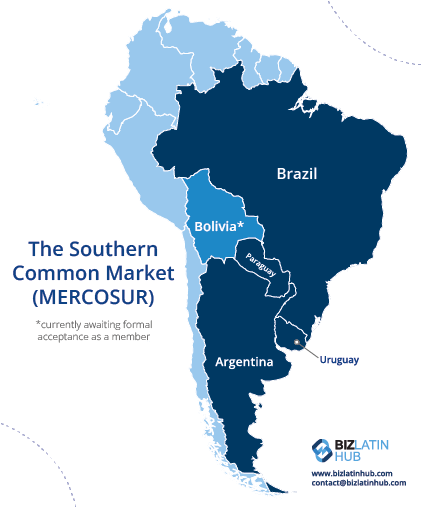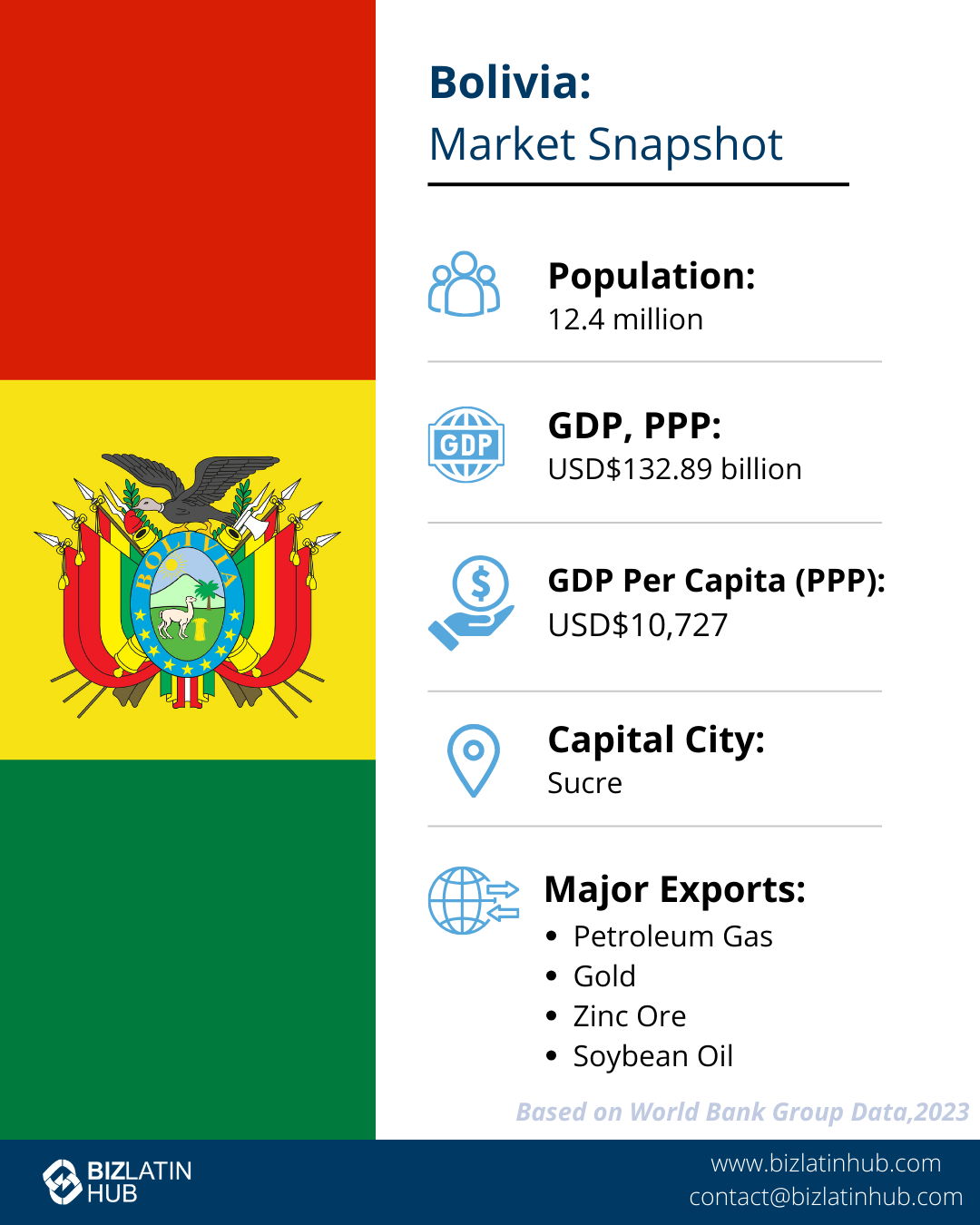In recent years, Bolivia has been working on highlighting its strengths to attract foreign investors. The country aims to achieve legal certainty and clarity, and balance macroeconomic, political and social stability.

Bolivia makes it quite clear that the country needs trade partners, and not bosses. The government explains that the investors obviously will take their profits, but regulations aim to keep some revenues and dividends in Bolivia for the purpose of boosting the economy, especially the hydrocarbon, electricity or mining area.
According to the Central Bank of Bolivia, foreign direct investment reached US$1.553 million in 2018, the highest number in several years. This boost fed into the country’s economic growth, mainly through the increase in reinvestment of profits. Gary Rodríguez, General Manager of the Bolivian Institute of Foreign Trade (IBCE), identified that natural resources are a strong attraction for foreign capital; although the hydrocarbons sector with 32% and mining with 21%, received half of the gross flows.
As Bolivia surfaces on foreign investors’ radars, we outline some profitable business opportunities offering long term commercial success in the Latin American country.
Table of Contents
Investment opportunities in Bolivia: Financial technology (fintech)
The finance world is ballooning with the introduction and momentum of technological innovation, creating a vast range of opportunities in fintech. Like many of its regional counterparts, Bolivia hasn’t fully explored its fintech potential. Jorge Velasco, a financial analyst, says that while the financial system to support an immense volume of business – in portfolio, public deposits and transferences – the emergence of new companies or startups specializing in financial technology is a very interesting investment opportunity in 2019.
Currently, high financial regulation in Bolivia could slow the speed of innovation, challenging the patience of fintech startups. However, again like many governments in the area, Bolivia’s policymaking and legislative changes inevitably move slower than the rate technological innovation of financing platforms. Judging by the response to fintech more generally in Latin America, it may only be a matter of time before more rigorous legal framework is implemented to enable businesses to fill the gaps in Bolivia’s fintech market.
Buildings and construction
The government is honing in its focus on Busch Port (located on Canal Tamengo), having recently signed a strategic alliance for the construction of major port facilities. The public-private alliance includes a public investment of US$250 million. Bolivia’s waterways currently carry around US$1.2 billion worth of soybeans, grains, and sunflower oils and derivatives. Bolivia wants to build on this transport system.
This generates an opportunity for the contractors to win projects in construction-administration of barges, storage facilities for mineral exports, rail and road infrastructure to support such an immense operation. The various projects encompassing the strengthening of Busch Port are expected to take around 4-5 years to undertake – particularly the groundwork for rail and roads.
Beneficially, once established this port and its corresponding rail projects will connect landlocked Bolivia with the Atlantic Ocean and strengthen established export channels to regional partners. The government expects an investment influx of around US$700 million in the next five years as a result of this construction work. Chinese investors are already making first moves, building a steel mill in El Mutún, a town where Bolivia exports processed iron.
Bioceanic Corridor
Busch Port isn’t the only location looking at getting a makeover. The Bolivian government is backing an agreement with Brazil, Paraguay and Peru to build a railway connecting the Pacific and Atlantic Oceans, with Peru’s Ilo port and Brazil’s Sao Paolo as final destinations. The main line will pass through La Paz and Santa Cruz in Bolivia.
In June 2018, the 4 governments met and agreed on regulatory framework to support this project. This railway will be around 3800 kilometres long, and carries a price tag of around US$10 billion.
Such a significant opportunity for external contractors should not be ignored. Not only will this line pass through several countries, but minor railway routes are expected to feed off the main line. Construction companies could expect to be in business in Bolivia for many years to come, should they win a contract with Bolivia for this project.
Health sector
The government is planning on building several hospitals and this will attract several projects and ventures. Further construction bids will be available in this space. Additionally, flow on effects from newly established health facilities include the chance for businesses to:
- provide training services to new health professionals
- import and on-sell health and medical equipment
- offer peripheral services to new health facilities, such as storage/handling, transport, communications and software.
Real estate
It is well known that Santa Cruz de la Sierra is the second most profitable city in the real estate segment in South America, according to residential sales and leasing site Infocasas. It shows an average annual profit that fluctuates between 6 and 8% for real estate owners.
The private construction sector has growth rate bordering on 6% in recent years, making residential and other private construction another profitable option for investors. Currently, around 42% of families in Santa Cruz do not have a house. Finding innovative ways to offer housing and solve other real estate quandaries – such as shared office space for small businesses – can draw in large financial returns for investors looking at large-scale projects.

Growth in Bolivia
The Gross Domestic Product (GDP) of Bolivia grew 4.22% in 2018, promoted by the increase in non-extractive, labor-intensive activities and domestic demand, according to the National Statistics Institute of Bolivia.
In 2018, the agricultural activity had significant growth, making an important contribution to the country’s GDP. This was emphasized by the cultivation of sugar cane, generating revenue stream increase of 22.04%, due to the demand of the sugar and the alcohol in the manufacturing industry.
National financial establishments grew 5.3% thanks to the application of the Financial Services Law, which allowed greater access to productive loans and housing of social interest, according to the state entity.
Bolivia’s export picture
Bolivian exports registered a year-on-year growth of 9% in 2018, valued at a total of US$8.965 billion dollars. The country’s strong export market is a significant drawcard for foreign investors and businesses.
Bolivia’s main exports are petroleum gas ($2.59 billion), zinc ($1.34 billion), gold ($1.04 billion), metallic minerals ($ 521 million) and soybean flour ($444 million). Its main export destinations are Brazil ($1.41 billion), Argentina ($1.24 billion), South Korea ($574 million), India ($552 million) and the United States ($542 million). With a diverse portfolio of trading partners, Bolivia opens doors for businesses looking to send their goods offshore and want to diversify their export destinations.
Bolivia is an emerging market in Latin America, often overshadowed by its high-performing neighbours and regional powers such as Brazil and Mexico. However, this only serves to position Bolivia as an up-and-coming investment destination, not yet saturated by major players who are instead moving into bigger neighbouring markets.
Explore investment opportunities in Bolivia with Biz Latin Hub
Like many others, we’re watching Bolivia’s progress as it steadily moves towards greater economic prosperity. The newness of Bolivia’s investment potential means that some processes and legal requirements for setting up a business and operating in or with Bolivia are difficult to navigate. For this, we recommend seeking local expertise and support to get your business off the ground.
Biz Latin Hub has been operating within Latin America for nearly 5 years. With offices in 12 countries in the region – and most recently, a new office in Australia – our team of local and expatriate professionals possess the expertise and depth of understanding you’ll need to enter Bolivia’s market.
We offer tailored business solutions in market entry and back-office services to ensure your company gets the best possible start in a new environment. For more information about how we can help with your Bolivian expansion, contact us today here at Biz Latin Hub.
Learn about our team and expert authors.

The information provided here within should not be construed as formal guidance or advice. Please consult a professional for your specific situation. Information provided is for informative purposes only and may not capture all pertinent laws, standards, and best practices. The regulatory landscape is continually evolving; information mentioned may be outdated and/or could undergo changes. The interpretations presented are not official. Some sections are based on the interpretations or views of relevant authorities, but we cannot ensure that these perspectives will be supported in all professional settings.